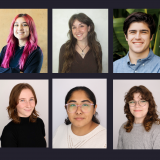What Your Extra Curricular Activities Teach You That Your Classes Can’t
October 4, 2016
 Shoshana Feld-Sobol
Shoshana Feld-Sobol
Strategic and Corporate Communication (’17)
Chapman University is an educational institution whose mission is to provide academic instruction to each and every student in their particular line of study. As students, we learn the discipline of our major, the nuances involved in our minor or cluster, and we get to dabble in the arts and mathematics with our general graduation requirements.
However, we learn so much more than our trade by being an active student on that Chapman campus. Most of us are also involved in outside activities which encompass a wide net of diverse extracurricular activities. I’ve been involved in a handful of these types of activities while being a student and they have given me a wealth of knowledge and experience that my classes simply cannot.
Extracurricular activities give students the opportunity to dive into almost any field, gain real world applicable knowledge and hands-on learning experience, all while meeting new people and enjoying the process. In short, they allow students to expand their horizons in a stimulating and pleasurable way.
As a senior, looking back at four years spent at a university, I can’t help but recall all I’ve learned, all the experiences I’ve had, the people I’ve met, and realize that a great deal of that growth occurred outside of the classroom. While there’s no doubt that my mind was intellectually stimulated and probed in courses, I’ve learned so much more than just academia.
Here is what you can learn from being involved in different clubs and groups on campus:
- Campus Publications: Being involved with a publication on campus teaches you how to combine the writing skills you’ve learned in school with your personal creative flair. It teaches you how to brainstorm fun and exciting article topics while making sure you gauge the interests of your peers to understand what they would want to read about. You are encouraged to follow and spot the latest fashion and media trends, and how to informally interview professors, campus leaders, and campus celebrities. As a contributing writer for Her Campus Chapman, I was tasked with writing a new article each week on a topic of my choosing. Thus, each and every week our chapter of writers would come to the meeting with a carefully brainstormed article topic. At the meeting we learned to collaborate on ideas and then execute our plan. This type of experience teaches spontaneous brainstorming, teamwork, and leadership.
- University Program Board: Being apart of the Marketing Team for the University Program Board at Chapman taught me how to apply the marketing tools I learned in class to real world experiences. As members of UPB we think of guerilla marketing tactics, create marketing plans and learn how to flush out the steps in an advertising campaign. I was able to see just how important each and every marketing idea was, regardless of how small or large they seemed. Being on the Marketing Team, very literally was a team effort. If everyone didn’t worth together, campaigns didn’t get implemented properly and our peer’s events felt the backlash. Thus, the importance of planning ahead of time and allotting enough time for Plan A failures and Plan B execution was of critical importance and a keen learning experience.
- Research Assistant: Doing research with a professor has been one of my favorite parts of being a student and one of my most educational experiences. It gave me the opportunity to delve into a topic and learn from a professor who is an expert in her field. As a research assistant I had the opportunity to work with Dr. Lisa Sparks on her research on the topic of cancer communication. Not only did I learn the ways in which communication errors and complications can impact families in the medical setting, but I also learned a great deal about the biology of cancer, nutrition, cultural setbacks in hospitals, and the different ways in which we can support people who have experience with the disease. I was able to work one-on-one with someone who has a breadth of knowledge on the topic while also being able to create some my own projects from our work. That mentorship and experience could not be replicated in a classroom.
- Professional Business Fraternity: As a brother (yes, in this fraternity we are all brothers) of the Alpha Kappa Psi fraternity, I’ve had the opportunity to expand my professional skills well beyond the scope of anything that I could have been taught in class. I participated in facilitated group interviews, public speaking engagements, resume and LinkedIn workshops, professional development events, and helped plan various fraternity events. Being in this fraternity we learn how to navigate being a professional, while also engaging in social events. This is especially applicable to the work setting where we will be surrounded by peers that are also our colleagues, but tasked with being a working adult; learning this balance before we enter the full time workforce is helpful. Apart from tangible experiences and events we partake in as brothers, the bulk of what we acquire from the organization is an increased sense of confidence and maturity in professional settings.
Courses do teach you a great deal, but they don’t teach us everything we need to know to be fully functioning and equip members of the workforce once we graduate. It’s important to supplement our educational endeavors with extracurricular experiences so that we can gain a robust and diverse portfolio of knowledge and experience upon graduation.

